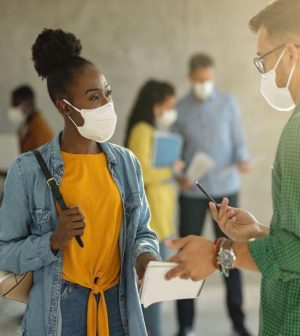- 10 Strategies to Overcome Insomnia
- Could Artificial Sweeteners Be Aging the Brain Faster?
- Techniques for Soothing Your Nervous System
- Does the Water in Your House Smell Funny? Here’s Why
- Can a Daily Dose of Apple Cider Vinegar Actually Aid Weight Loss?
- 6 Health Beverages That Can Actually Spike Your Blood Sugar
- Treatment Options for Social Anxiety Disorder
- Understanding the Connection Between Anxiety and Depression
- How Daily Prunes Can Influence Cholesterol and Inflammation
- When to Take B12 for Better Absorption and Energy
Huge Study Shows Masks Do Indeed Limit Coronavirus Spread

A new, huge study provides real-world proof that mask-wearing limits the spread of the coronavirus.
“I think this should basically end any scientific debate about whether masks can be effective in combating COVID at the population level,” Jason Abaluck, a Yale University economist who helped lead the study, told the Washington Post.
He called the findings “a nail in the coffin” of arguments against masks.
Abaluck and colleagues tracked more than 340,000 adults across 600 villages in rural Bangladesh, making this the largest randomized study on the effectiveness of masks at limiting the spread of the virus.
After being encouraged to wear masks, mask-wearing among the participants increased by 28.8 percentage points, resulting in a 9.3% reduction in confirmed symptomatic COVID-19 infections and a further 11.9% reduction in COVID-19 symptoms, the Post reported.
The findings do not mean that masks were only 9.3% effective, the researchers emphasized.
“I think a big error would be to read this study and to say, ‘Oh, masks can only prevent 10% of symptomatic infections,'” Abaluck told the Post.
It’s likely the number would be several times higher if masking were universal, he said.
Mask-wearing had been mandated in Bangladesh since March 2020, but use of masks is limited. The researchers found they increased mask-wearing in the intervention group from 13 percent to 42 percent — an increase of 28.8 percentage points.
The study, which was published on a preprint server and is under peer review with the journal Science, may make the most convincing case yet for mask use, according to some experts.
“This is an incredibly challenging but important study to pull off,” Megan Ranney, an emergency medicine physician and professor at Brown University, told the Post. “Anti-mask people keep saying, ‘Where’s the randomized controlled trial?’ Well, here you go.”
“It’s not just modeling or looking back at studies,” Lawrence Gostin, faculty director of the O’Neill Institute for National and Global Health Law at Georgetown University, told the Post. “This is the gold standard of scientific knowledge.”
“I see no reason why the interaction between the mask and the virus will behave any differently in rural Bangladesh or rural Kansas or urban New York or San Francisco,” Gostin added. “The biology is the same.”
More information
Visit the U.S. Centers for Disease Control and Prevention for more on masks.
SOURCE: Washington Post
Source: HealthDay
Copyright © 2026 HealthDay. All rights reserved.










